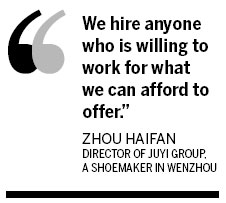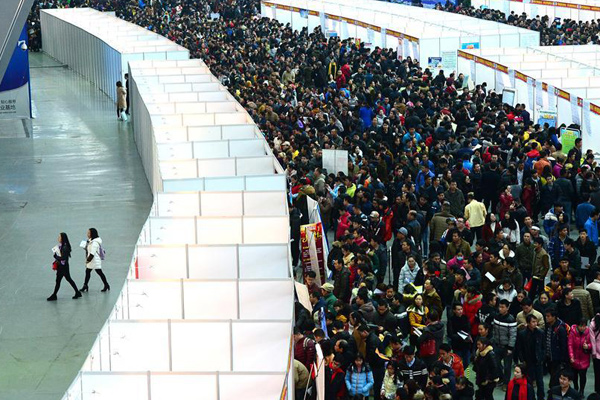Labor shortages, rising rents, falling sales
Su Zhiguo's convenience store on Xiedudadao, or Shoe Capital Avenue, opposite the Juyi factory complex, used to be a hotspot in the area, teeming with customers from the nearby factories. Opened in 2006, the store has grown from 30 square meters to 300 square meters. Su said he wished he had not been so ambitious.
Su said his sales have dropped more than 30 percent since the middle of last year. Not only are there fewer customers, those who still come are buying less than before.
What's more, competition has intensified.

When business was good, new stores opened to fight for a share of the pie. It was fine when the pie was getting bigger. Now, "we have to cut prices to compete for the dwindling clientele", Su said.
Meanwhile, the annual rent for his shop has gone up to 230,000 yuan from 150,000 yuan.
"I am not moving the big ticket items that can yield a wider profit margin fast enough to make money to pay the rent," Su said, adding that he is seriously considering moving to smaller premises.
"That's the only way I can stay afloat."
He might as well be considering moving to another district, such as Wenzhou High-Tech Park, 21 kilometers to the south, where the roads are wide and the buildings are new. What's more, the people working there seem to be more affluent. There's just one problem: there aren't enough of them around, as Zhou Hailan found out to her disappointment.
Zhou opened a small convenience store there with the money she earned from buying and selling properties for a quick profit. In other places, such an undertaking would be called speculation. But that's a bad word in Wenzhou. The word speculation doesn't even exist in the local dialect. "I was an investor," Zhou insisted.
Her new investment obviously isn't paying off that well. "There is almost no business at all," said Zhou.
"There are few local people working in this district. As a result, items such as the local-brand liquor, or anything else produced and sold just in Wenzhou, literally doesn't sell at all."
Of course the decision to open the store was made after thorough consideration. "There is competition everywhere in Wenzhou. As this district is relatively new, we may have more opportunities here," she said.
Zhou said she is going to wait it out.
"I can imagine that this place will be booming with new factories and people earning good money," she said. "I'll then be in a good position because I was the first to stake my claim here."
Nearby her store is Xie Maohui's 100-square-meter two-story restaurant. On the third day after the Lantern Festival, Xie returned from his hometown of Lishui, a city in southwestern Zhejiang, and started preparations for the year ahead.
Xie moved his restaurant to the high-tech park at the beginning of 2012 after its previous location in downtown Wenzhou was demolished.
"Business there was lousy, but here it's even worse. As almost all the factories here provide meals, there is little chance for us. The staff just come to us for a change," he said.
The only advantage that Xie can think of is that the rent is not that high, at around 40,000 yuan a year. But he said he hopes his business can improve this year, as his wife is pregnant.
"I need more money to support my family," he said.
shijing@chinadaily.com.cn
- China to face labor shortage
- Shifting labor, rising incomes spur demand
- Competition, labor costs hurt African profits
- Renault, French unions close to labor deal
- Labor shortage worsens as migrant workers stay hom
- China's labor force drops for first time in 2012
- Labor shortage hits cities as holiday nears
- China to revise labor law























